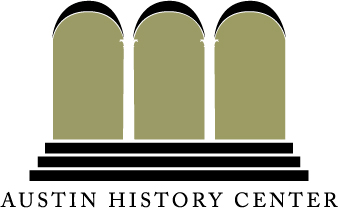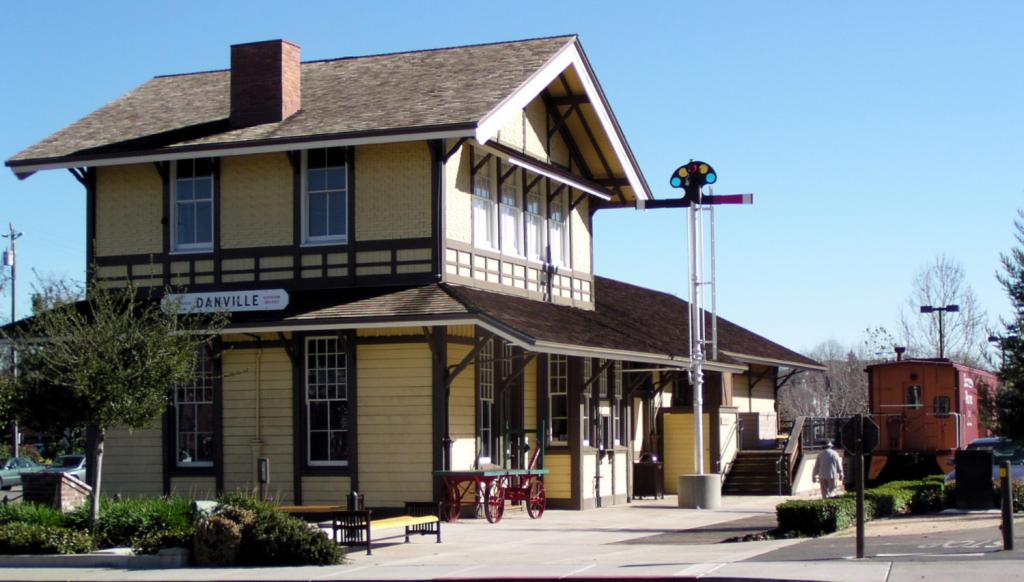from Apr. 29, 1865
"President Lincoln has been assassinated"
-
Full Title
La Orquesta: Periodico Omniscio, de Buen Humor y con Caricaturas
-
Description
News article about President Lincoln’s assassination, the death of one of his sons and Mr. Seward is also (mistakenly) reported.
-
Source
Independent Mexico in newspapers, the 19th century; reel 168
-
Rights
This item may be reproduced and used for any purpose, including research, teaching, private study, publication, broadcast or commercial use, with the proper citation and attribution. Citation: Independent Mexico in newspapers, the 19th-century (microfilm set). LLILAS Benson Latin American Studies and Collections, the University of Texas at Austin.
-
Tags
-
Cite this Item
La Orquesta. "La Orquesta: Periodico Omniscio, de Buen Humor y con Caricaturas". Méjico : Impr. de la Paz. Remembering Lincoln. Web. Accessed December 15, 2025. https://rememberinglincoln.fords.org/node/502
from Apr. 29, 1865
La Orquesta: Periodico Omniscio, de Buen Humor y con Caricaturas
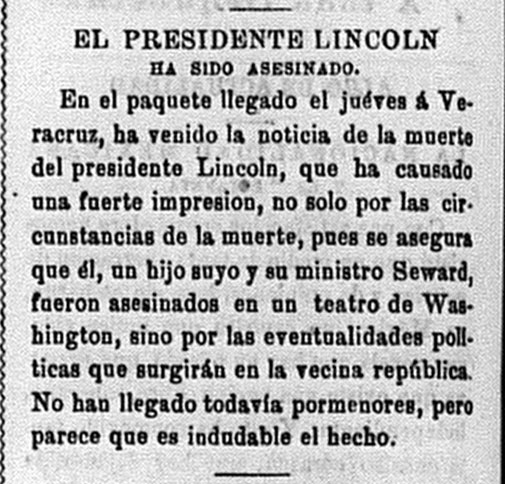
-
Description
News article about President Lincoln’s assassination, the death of one of his sons and Mr. Seward is also (mistakenly) reported.
-
Source
Independent Mexico in newspapers, the 19th century; reel 168
-
Rights
This item may be reproduced and used for any purpose, including research, teaching, private study, publication, broadcast or commercial use, with the proper citation and attribution. Citation: Independent Mexico in newspapers, the 19th-century (microfilm set). LLILAS Benson Latin American Studies and Collections, the University of Texas at Austin.
-
Creator
La Orquesta
-
Publisher
Méjico : Impr. de la Paz
-
Date
April 29, 1865
from May. 3, 1865
G. Barrios to Matias Romero
-
Full Title
Letter to Mexican diplomat Matias Romero from G. Barrios
-
Description
Barrios expresses shock at learning of Lincoln’s assassination at the theater. Description of Lincoln as “the personification of US unity and faithful representative of the Monroe Doctrine”. Hope that the assassination won’t influence policy toward Mexico negatively, though it’s likely nothing could lead the Americans to change their stance on European intervention in the hemisphere.
-
Source
Matias Romero: An Inventory of Microfilm of His Papers at the Benson Latin American Collection
-
Rights
This item may be reproduced and used for any purpose, including research, teaching, private study, publication, broadcast or commercial use, with the proper citation and attribution. Citation: Matías Romero: An Inventory of Microfilm of His Papers at the Benson Latin American Collection. LLILAS Benson Latin American Studies and Collections, the University of Texas at Austin.
-
Tags
-
Cite this Item
Barrios, G.. "Letter to Mexican diplomat Matias Romero from G. Barrios". Remembering Lincoln. Web. Accessed December 15, 2025. https://rememberinglincoln.fords.org/node/501
from May. 3, 1865
Letter to Mexican diplomat Matias Romero from G. Barrios
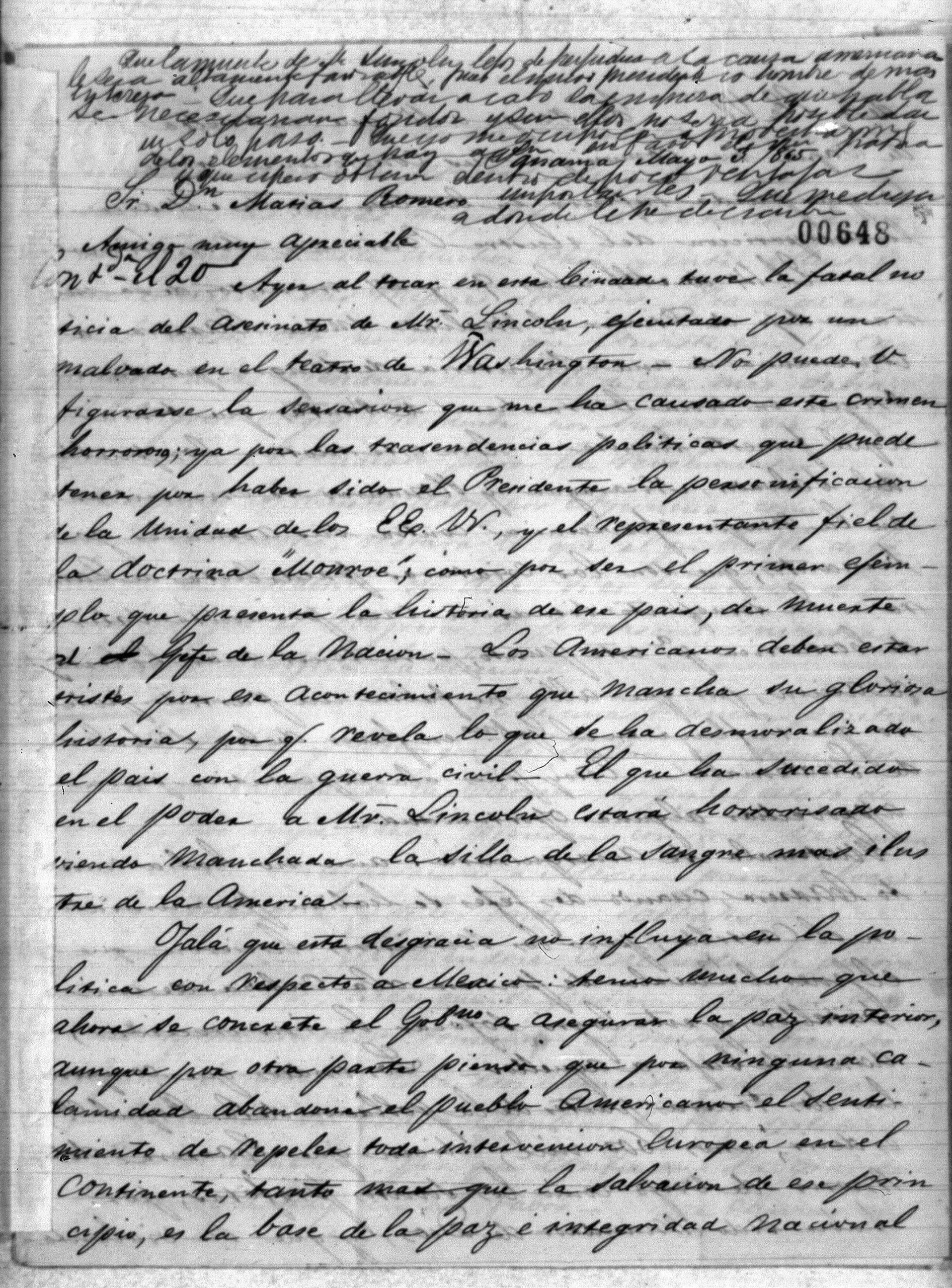
-
Description
Barrios expresses shock at learning of Lincoln’s assassination at the theater. Description of Lincoln as “the personification of US unity and faithful representative of the Monroe Doctrine”. Hope that the assassination won’t influence policy toward Mexico negatively, though it’s likely nothing could lead the Americans to change their stance on European intervention in the hemisphere.
-
Source
Matias Romero: An Inventory of Microfilm of His Papers at the Benson Latin American Collection
-
Rights
This item may be reproduced and used for any purpose, including research, teaching, private study, publication, broadcast or commercial use, with the proper citation and attribution. Citation: Matías Romero: An Inventory of Microfilm of His Papers at the Benson Latin American Collection. LLILAS Benson Latin American Studies and Collections, the University of Texas at Austin.
-
Creator
Barrios, G.
-
Date
May 3, 1865
from Apr. 15, 1865
Eugene Carlos Bartholomew Diary Entry
-
Full Title
Eugene Carlos Bartholomew Diary Entry
-
Description
Entry in Eugene Carlos Bartholomew's journal dated Saturday, April 15, 1865.
-
Transcription
Sat. Apr. 15
Seward is not dead, but Lincoln died this morning. -
Source
Austin History Center, FP D.7 A.9, Diary No. 9
-
Rights
Use of this item for research, teaching and private study is permitted with proper citation and attribution. Reproduction of this item for publication, broadcast or commercial use requires written permission. For permission, please contact The Austin History Center at ahc_reference@austintexas.gov. For reproduction information please visit http://library.austintexas.gov/ahc/ordering-photos.
-
Tags
-
Cite this Item
Eugene Carlos Bartholomew. "Eugene Carlos Bartholomew Diary Entry". Remembering Lincoln. Web. Accessed December 15, 2025. https://rememberinglincoln.fords.org/node/500
from Apr. 15, 1865
Eugene Carlos Bartholomew Diary Entry
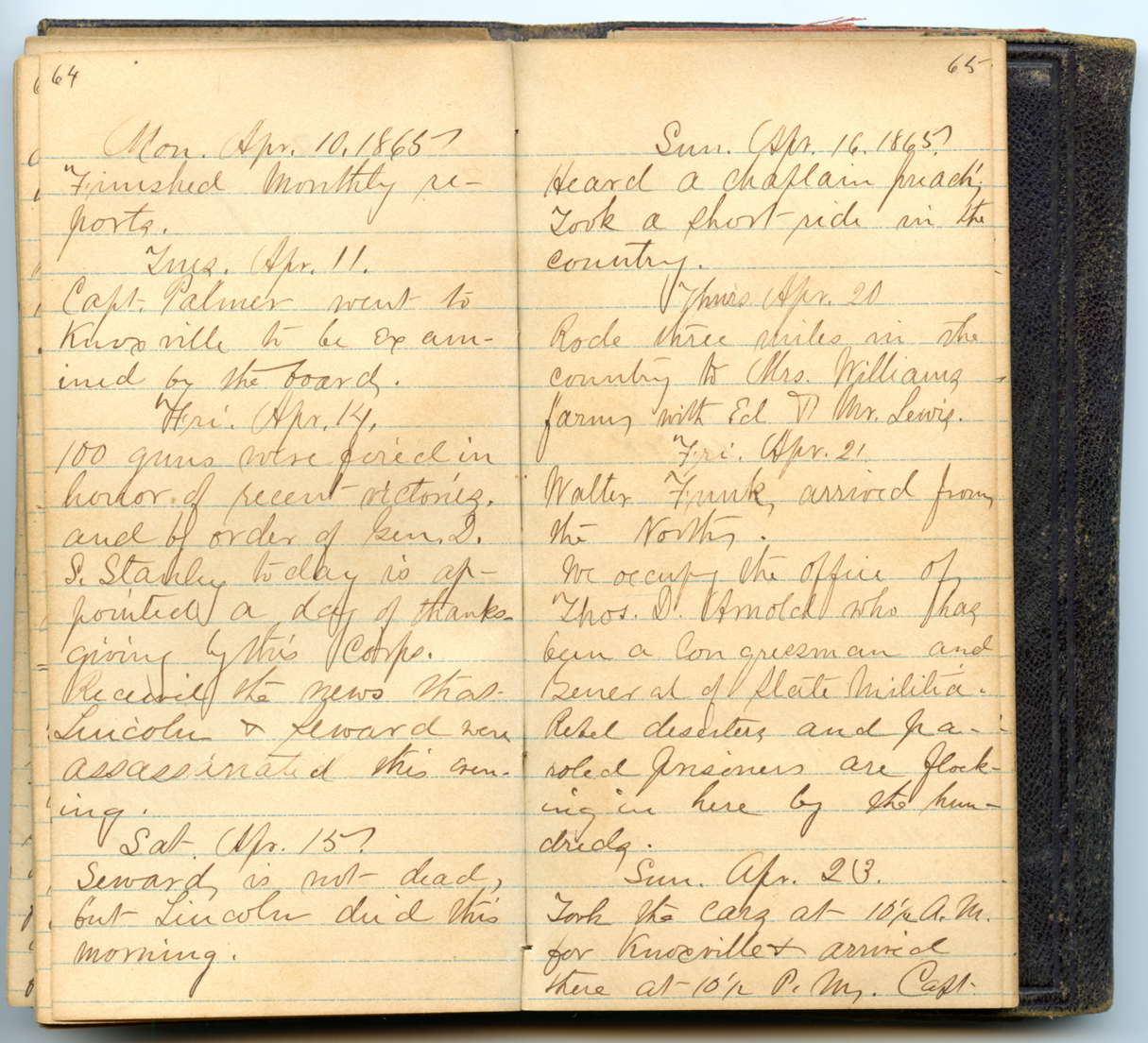
-
Description
Entry in Eugene Carlos Bartholomew's journal dated Saturday, April 15, 1865.
-
Source
Austin History Center, FP D.7 A.9, Diary No. 9
-
Rights
Use of this item for research, teaching and private study is permitted with proper citation and attribution. Reproduction of this item for publication, broadcast or commercial use requires written permission. For permission, please contact The Austin History Center at ahc_reference@austintexas.gov. For reproduction information please visit http://library.austintexas.gov/ahc/ordering-photos.
-
Creator
Eugene Carlos Bartholomew
-
Date
April 15, 1865
from Apr. 15, 1865
"Death of the president"
-
Full Title
"Death of the president"
-
Description
Article in the Second Edition of the Daily Morning Chronicle announcing the death of President Abraham Lincoln and commenting on the intensity of the nation's mourning.
-
Transcription
ABRAHAM LINCOLN IS DEAD!
If tears had audible language, a shriek would go up from these States which would startle the world from its propriety.
Strong men use the impressive language of women - TEARS. Women bow their heads in the dust. Children sleep troubledly.
Words are at this time weak and vain. Let us all, with heart and voice, say that
"This grave shall have a LIVING MONUMENT!" -
Source
Washingtoniana Microfilm Collection
-
Rights
This item may be reproduced and used for any purpose, including research, teaching, private study, publication, broadcast or commercial use, with proper citation and attribution.
-
Tags
-
Cite this Item
Daily Morning Chronicle. ""Death of the president"". Remembering Lincoln. Web. Accessed December 15, 2025. https://rememberinglincoln.fords.org/node/499
from Apr. 15, 1865
"Death of the president"
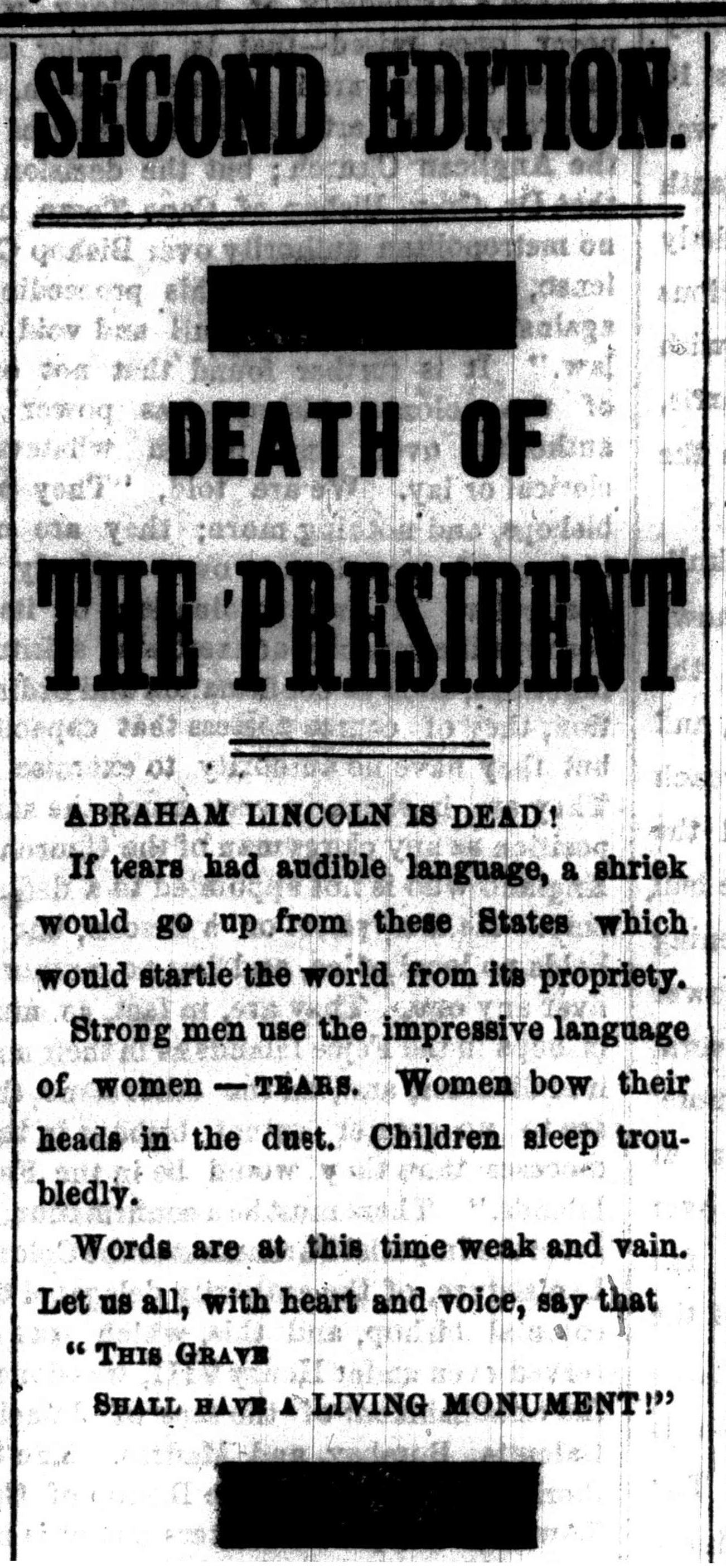
-
Description
Article in the Second Edition of the Daily Morning Chronicle announcing the death of President Abraham Lincoln and commenting on the intensity of the nation's mourning.
-
Source
Washingtoniana Microfilm Collection
-
Rights
This item may be reproduced and used for any purpose, including research, teaching, private study, publication, broadcast or commercial use, with proper citation and attribution.
-
Creator
Daily Morning Chronicle
-
Date
April 15, 1865
-
Material
newspaper
from Apr. 15, 1865
Removal of the President's Body
-
Full Title
"Removal of the body of the President to the executive mansion"
-
Description
Article describing the procession accompanying President Abraham Lincoln's body from the Peterson house to the White House. The article describes the procession as escorted by Union Light Guard calvary and military officers, as well as a large crowd, which descended on the Peterson house once the President's body was removed.
-
Transcription
Removal of the body of the president to the executive mansion.
Shortly after nine o'clock this morning the remains were placed in a temporary coffin, under the direction of Mr. Frank Sands, and removed to the Whtie House, six young men of the Quartermaster's Department carrying the body the house.
An escort of cavalry, (Union Light Guard,) under the command of Lieut. Jamison, accompanied the remains, which were followed by General Augur, commanding the Department of Washington; General Rucker, Depot Quartermaster; Colonel Pelouze, of the War Department; Captain Finley Anderson, A. A. G.; Hancock's corps; Captain D. G. Thomas, Clothing Depot; Captain J. H. Crowell, and Captain C. Baker.
The solemn procession moved slowly up Tenth street to G, and thence to the White House, the large crowd present along the route standing uncovered. Immediately on the guard being removed, a rush was made towards the house occupied during the night by the President, remaining about the entrance for some time. -
Source
Washingtoniana Microfilm Collection
-
Rights
This item may be reproduced and used for any purpose, including research, teaching, private study, publication, broadcast or commercial use, with proper citation and attribution.
-
Tags
-
Cite this Item
Daily Constitutional Union. ""Removal of the body of the President to the executive mansion"". Remembering Lincoln. Web. Accessed December 15, 2025. https://rememberinglincoln.fords.org/node/498
from Apr. 15, 1865
"Removal of the body of the President to the executive mansion"
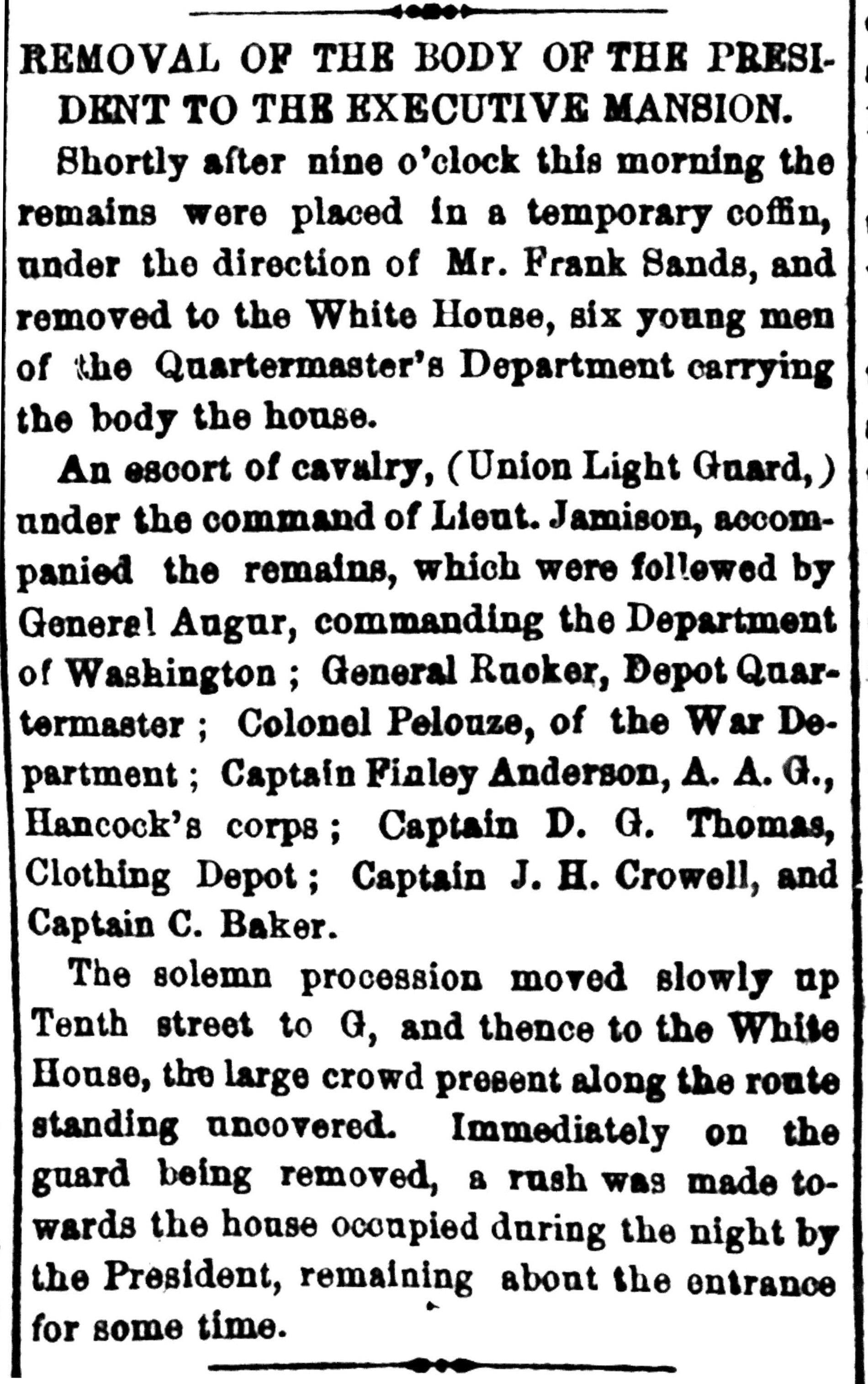
-
Description
Article describing the procession accompanying President Abraham Lincoln's body from the Peterson house to the White House. The article describes the procession as escorted by Union Light Guard calvary and military officers, as well as a large crowd, which descended on the Peterson house once the President's body was removed.
-
Source
Washingtoniana Microfilm Collection
-
Rights
This item may be reproduced and used for any purpose, including research, teaching, private study, publication, broadcast or commercial use, with proper citation and attribution.
-
Creator
Daily Constitutional Union
-
Date
April 15, 1865
-
Material
newspaper
from Apr. 15, 1865
"War Department report"
-
Full Title
"War Department report on the Health of Abraham Lincoln and William Seward"
-
Description
Publication of a report from Secretary of War Edwin M. Stanton to General John A. Dix issued at 3 a.m. on the morning after President Abraham Lincoln was shot and William Seward and his household were attacked. Stanton states that the president still lives but is not conscious, but that it seems Seward, his son Frederick Steward, and their household attendant may live. Stanton identifies John Wilkes Booth as the prime suspect in the President's assassination, but states that his connection to the Seward attack is uncertain. Stanton states that Chief Justice David K. Cartter is in charge of gathering evidence and Booth's horse has been found.
-
Transcription
War Department, Washington, D. C. 3 a.m., April 15
Major General Dix, New York:
The President still breathes, but is quite insensible, as he has been ever since he was shot. He evidently did not see the person who shot him, but was looking on the stage as he was approached behind.
Mr. Steward has rallied and it is hoped he may live. Frederick Seward's condition is very critical. The attendant who was present was stabbed through the lungs, and is not expected to live. The wounds of Major Seward are not serious.
Investigation strongly indicates J. Wilkes Booth as assassin of the President. Whether it was the same, or a different person that attempted to murder Mr. Seward, remains in doubt.
Chief Justice Cartter is engaged in taking the evidence. Every exertion has been made to prevent the escape of the murderer. His horse has been found on the road near Washington
Edwin M. Stanton, Secretary of War -
Source
Washingtoniana Microfilm Collection
-
Rights
This item may be reproduced and used for any purpose, including research, teaching, private study, publication, broadcast or commercial use, with proper citation and attribution.
-
Tags
-
Cite this Item
Daily Constitutional Union. ""War Department report on the Health of Abraham Lincoln and William Seward"". Remembering Lincoln. Web. Accessed December 15, 2025. https://rememberinglincoln.fords.org/node/497
from Apr. 15, 1865
"War Department report on the Health of Abraham Lincoln and William Seward"
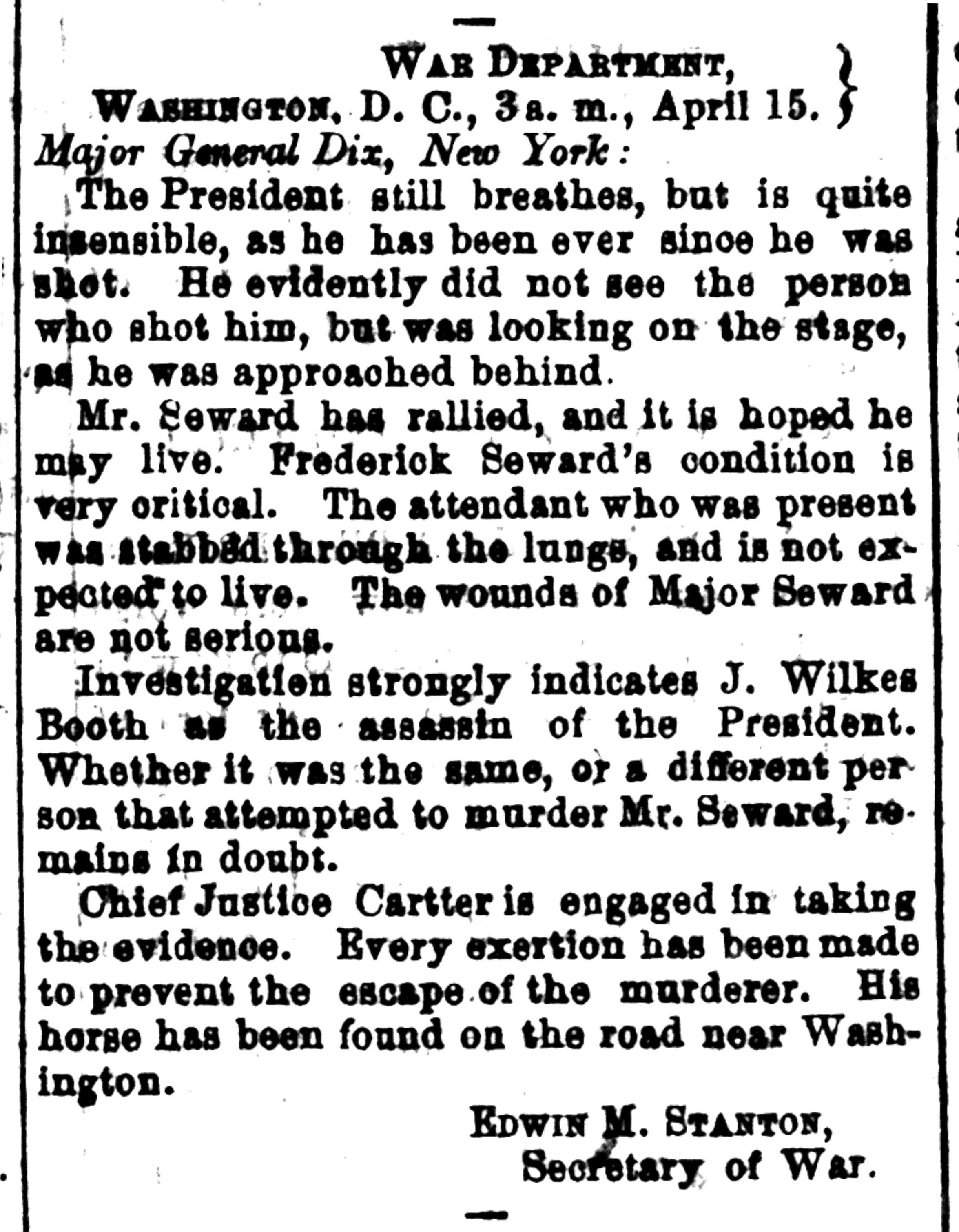
-
Description
Publication of a report from Secretary of War Edwin M. Stanton to General John A. Dix issued at 3 a.m. on the morning after President Abraham Lincoln was shot and William Seward and his household were attacked. Stanton states that the president still lives but is not conscious, but that it seems Seward, his son Frederick Steward, and their household attendant may live. Stanton identifies John Wilkes Booth as the prime suspect in the President's assassination, but states that his connection to the Seward attack is uncertain. Stanton states that Chief Justice David K. Cartter is in charge of gathering evidence and Booth's horse has been found.
-
Source
Washingtoniana Microfilm Collection
-
Rights
This item may be reproduced and used for any purpose, including research, teaching, private study, publication, broadcast or commercial use, with proper citation and attribution.
-
Creator
Daily Constitutional Union
-
Date
April 15, 1865
-
Material
newspaper
from Apr. 17, 1865
"Meeting of Colored Citizens"
-
Full Title
"Meeting of colored citizens in honor of the emancipation in the District of Columbia - The death of our late president"
-
Description
Resolutions of a meeting of colored citizens of the District of Columbia, which met on April 16, 1865, the third anniversary of emancipation in Washington, D.C. The group resolved to mourn the recent assassination of Abraham Lincoln and pay tribute to his role as emancipator. The resolution states that they believed Lincoln's should be seen as discipline for the nation's departure from the principles of equality present in the founding documents, including the Declaration of Independence. The group also sends its condolences to the Lincoln family and Willard H. Seward and his household, which were also attacked the night of the president's assassination.
-
Transcription
Meeting of colored citizens in honor of the emancipation in the District of Columbia - The death of our late president
Persuant to the notice that appeared in The Chronicle, the colored citizens of Washington met in the Fifteenth street Presbyterian church on the anniversary of the emancipation in the District of Columbia.
The meeting was organized by electing Mr. C. A. Stewart chairman, and Mr. W. H. Wormley secretary. Remarks were then made by several speakers, relative to the death of the late President of the United States.
The Chair appointed the following gentlemen a committee on resolutions:
Samuel J. Datcher, William Syphax, D. G. Muse, William A. Hughes, and John F. Cook
The committee, after a brief withdrawal reported the following resolutions, which were unanimously adopted, as expressive of the feelings of the meeting.
Whereas on the 14th of April, 1865, our late President, Abraham Lincoln, was foully assassinated; and, whereas, in him we, the colored people of the District of Columbia have lost an emancipator, benefactor, friend and leader: therefore be it
Resolved, That we, in common with all other loyal citizens of the Republic, have cause to mourn the sudden loss of one whose faithfulness to convictions of duty, and earnest execution of his realizations of the truth whose warm-heartedness, magnanimity, frankness, and honesty have endeared him to our hearts,
Resolved, That we devoutly feel this lamentable event to be a part of the chastening discipline to which the nation is being subjected for its departure from the original principles on which the Government was founded, the self-evident and unyielding truths of the Declaration of Independence, "that all men are born free and equal and endowed with the inalienable gift of life, liberty, and the pursuit of happiness."
Resolved, that we condole with his sorrowing wife and bereaved children in the terrible bereavement; and our sincree prayers shall be to Almighty God to sustain them in their hour of saddening trial.
Resolved, that we sincerely sympathize with the Hon. Secretary of State, and his son the able assistant Secretary, and their families, in their great suffering and aggravated injuries, and pray God for their speedy recovery to health.
Resolved, that the foregoing resolutions be published in the city papers, and a copy be transmitted to the family of our late president. -
Source
Washingtoniana Microfilm Collection
-
Rights
This item may be reproduced and used for any purpose, including research, teaching, private study, publication, broadcast or commercial use, with proper citation and attribution.
-
Tags
-
Cite this Item
Daily Morning Chronicle. ""Meeting of colored citizens in honor of the emancipation in the District of Columbia - The death of our late president"". Remembering Lincoln. Web. Accessed December 15, 2025. https://rememberinglincoln.fords.org/node/494
from Apr. 17, 1865
"Meeting of colored citizens in honor of the emancipation in the District of Columbia - The death of our late president"
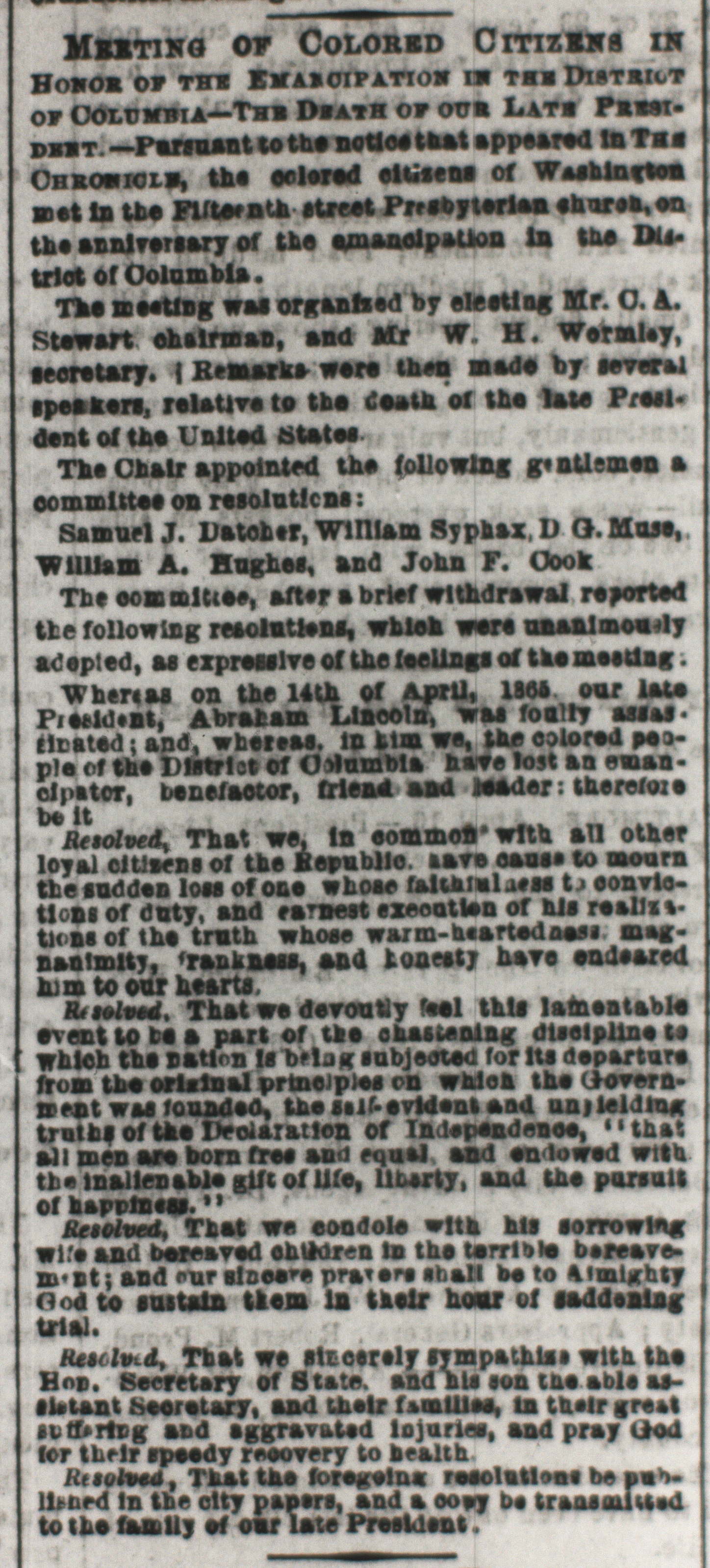
-
Description
Resolutions of a meeting of colored citizens of the District of Columbia, which met on April 16, 1865, the third anniversary of emancipation in Washington, D.C. The group resolved to mourn the recent assassination of Abraham Lincoln and pay tribute to his role as emancipator. The resolution states that they believed Lincoln's should be seen as discipline for the nation's departure from the principles of equality present in the founding documents, including the Declaration of Independence. The group also sends its condolences to the Lincoln family and Willard H. Seward and his household, which were also attacked the night of the president's assassination.
-
Source
Washingtoniana Microfilm Collection
-
Rights
This item may be reproduced and used for any purpose, including research, teaching, private study, publication, broadcast or commercial use, with proper citation and attribution.
-
Creator
Daily Morning Chronicle
-
Date
April 17, 1865
-
Material
newspaper
from Apr. 17, 1865
"Mourning Badge"
-
Full Title
"Mourning Badge"
-
Description
Excerpt from the Daily Morning Chronicle stating that Barnet & Co., located at 262 Pennsylvania Avenue, are selling mourning badges which feature the face of President Abraham Lincoln.
-
Transcription
Mourning badge - Our citizens will thank us for calling their attention to the fact that Barnet & Co., No. 262 Pa. Av., have some excellent portraits of our late President done up in mourning ribbon, making a neat badge to wear on the breast. We shall all show, in some manner, our esteem for one who so pre-eminently had the good of his country at heart and manifested it in his every act. What more simple, yet impressive, than wearing his honest face draped in mourning next our heart? We understand the firm above named will be prepared to fill orders this morning.
-
Source
Washingtoniana Microfilm Collection
-
Rights
This item may be reproduced and used for any purpose, including research, teaching, private study, publication, broadcast or commercial use, with proper citation and attribution.
-
Tags
-
Cite this Item
Daily Morning Chronicle. ""Mourning Badge"". Remembering Lincoln. Web. Accessed December 15, 2025. https://rememberinglincoln.fords.org/node/493
from Apr. 17, 1865
"Mourning Badge"
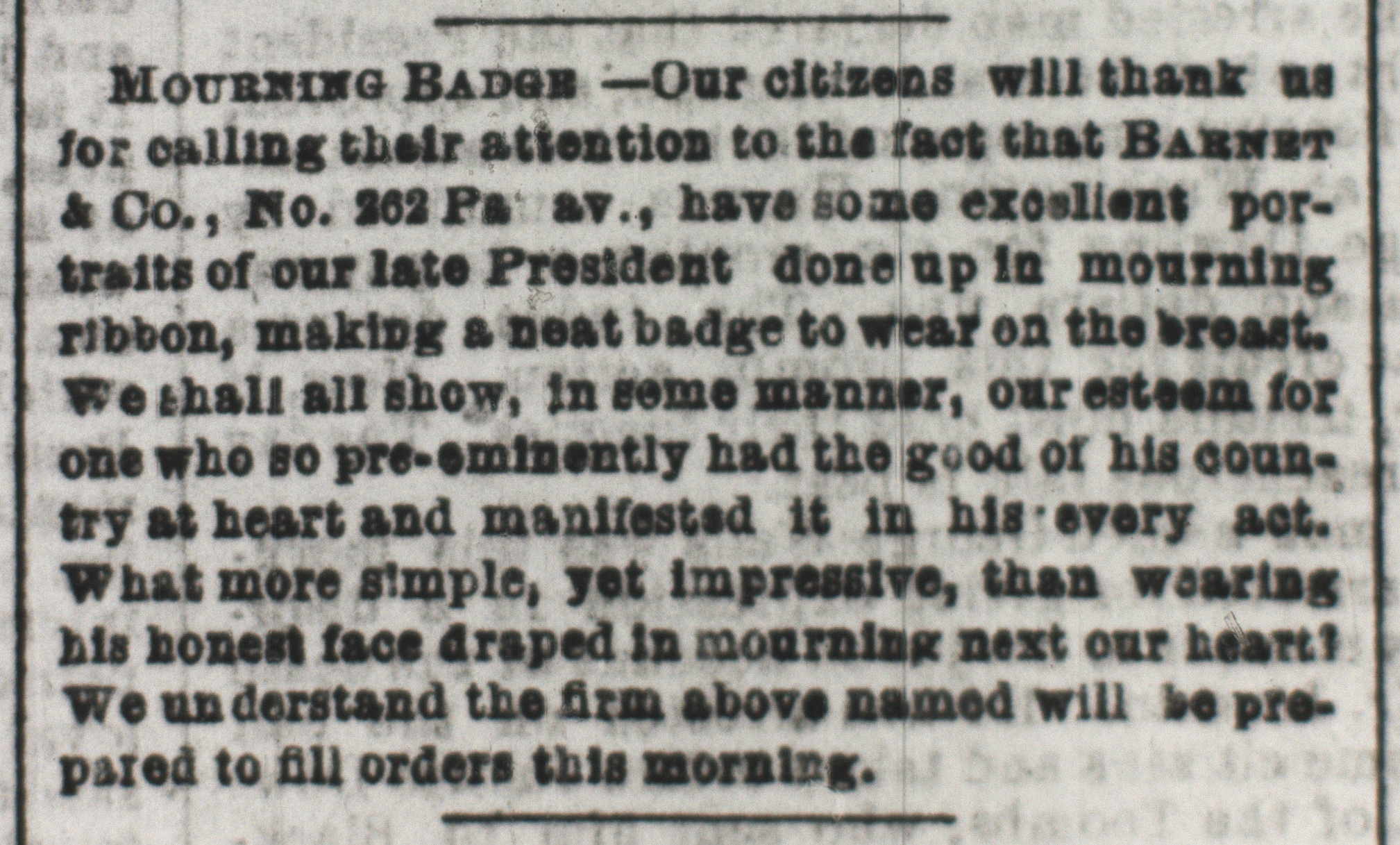
-
Description
Excerpt from the Daily Morning Chronicle stating that Barnet & Co., located at 262 Pennsylvania Avenue, are selling mourning badges which feature the face of President Abraham Lincoln.
-
Source
Washingtoniana Microfilm Collection
-
Rights
This item may be reproduced and used for any purpose, including research, teaching, private study, publication, broadcast or commercial use, with proper citation and attribution.
-
Creator
Daily Morning Chronicle
-
Date
April 17, 1865
-
Material
newspaper
from Apr. 15, 1865
Important Order from D.C.
-
Full Title
"Important order by A. C. Richards, Superintendent of the Metropolitan Police"
-
Description
Reprinting of an official order from Washington, D.C. Metropolitan Police Department Superintendent Almarin C. Richards issued at 3 a.m. on April 15, 1865, the day after the shooting of President Abraham Lincoln's and the day of his death. The order requires all places in the city that sell liquor to be closed that day and night.
-
Transcription
Important order by A. C. Richards, Superintendent of the Metropolitan Police. The following was issued by Superintendent Richards at 3 o'clock this morning: In view of the melancholy events of last evening, I am directed to cause all places where liquor is sold to be closed during this day and night. The sergeants of he several precincts will see that this order is enforced. A. C. Richards, Superintendent.
-
Source
Washingtoniana Microfilm Collection
-
Rights
This item may be reproduced and used for any purpose, including research, teaching, private study, publication, broadcast or commercial use, with proper citation and attribution.
-
Tags
-
Cite this Item
Daily Morning Chronicle. ""Important order by A. C. Richards, Superintendent of the Metropolitan Police"". Remembering Lincoln. Web. Accessed December 15, 2025. https://rememberinglincoln.fords.org/node/489
from Apr. 15, 1865
"Important order by A. C. Richards, Superintendent of the Metropolitan Police"

-
Description
Reprinting of an official order from Washington, D.C. Metropolitan Police Department Superintendent Almarin C. Richards issued at 3 a.m. on April 15, 1865, the day after the shooting of President Abraham Lincoln's and the day of his death. The order requires all places in the city that sell liquor to be closed that day and night.
-
Source
Washingtoniana Microfilm Collection
-
Rights
This item may be reproduced and used for any purpose, including research, teaching, private study, publication, broadcast or commercial use, with proper citation and attribution.
-
Creator
Daily Morning Chronicle
-
Date
April 15, 1865
-
Material
newspaper
from Apr. 17, 1865
General Order No. 27
-
Full Title
General Order No. 27 April 17, 1865
-
Description
This is a general order issued by Headquarters Department of the Pacific at the direction of Major General McDowell. The order bans any public celebration of the assassination of the President. Any newspaper that violates the order is subject to seizure.
-
Source
Private collection
-
Rights
This item may be reproduced and used for any purpose, including research, teaching, private study, publication, broadcast or commercial use, with proper citation and attribution.
-
Tags
-
Cite this Item
R. C. Drum. "General Order No. 27 April 17, 1865". United States Army Department of the Pacific. Remembering Lincoln. Web. Accessed December 15, 2025. https://rememberinglincoln.fords.org/node/488
from Apr. 17, 1865
General Order No. 27 April 17, 1865
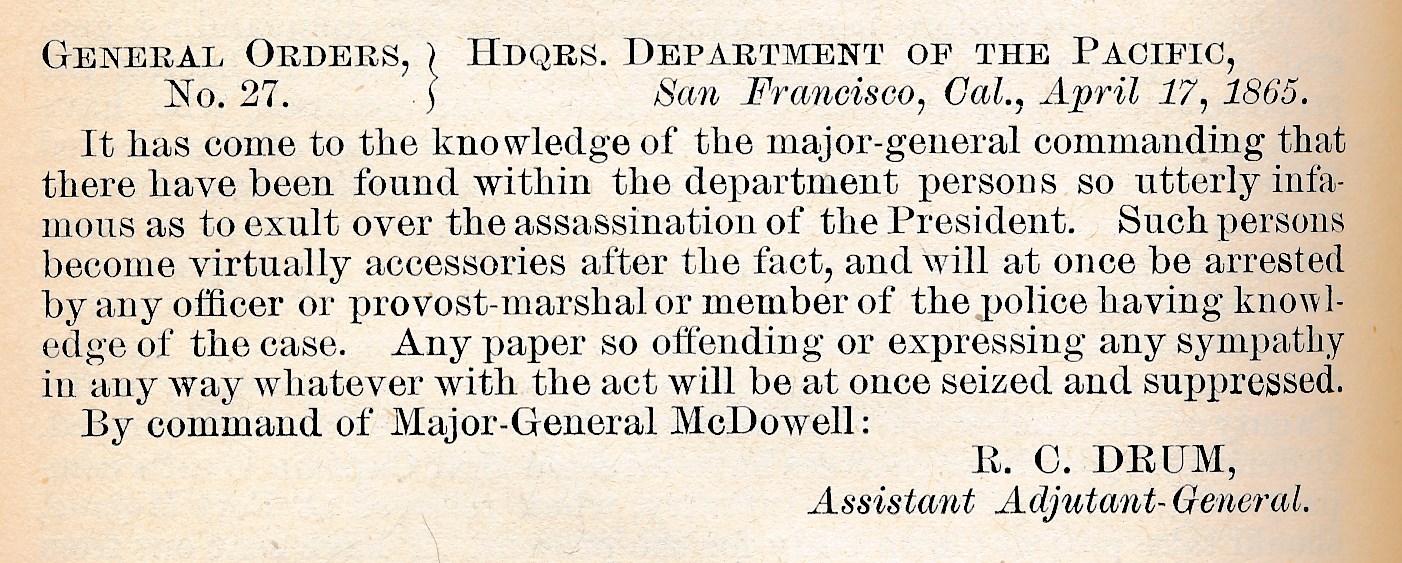
-
Description
This is a general order issued by Headquarters Department of the Pacific at the direction of Major General McDowell. The order bans any public celebration of the assassination of the President. Any newspaper that violates the order is subject to seizure.
-
Source
Private collection
-
Rights
This item may be reproduced and used for any purpose, including research, teaching, private study, publication, broadcast or commercial use, with proper citation and attribution.
-
Creator
R. C. Drum
-
Publisher
United States Army Department of the Pacific
-
Date
April 17, 1865
-
Material
Paper

